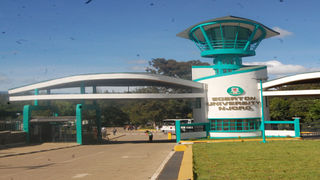
Egerton University’s Njoro Campus.
| Francis Mureithi | Nation Media GroupNews
Premium
Egerton’s crisis unsurprising if you've been paying attention to decline
What you need to know:
- An audit report last year exposed an institution that routinely flouts regulations that resulted in the deep financial crisis.
- The university has also been on the spot for buying ICT equipment without adequate budgetary provision to meet the obligations of the resultant contract.
The indefinite closure of Egerton University last Friday was not surprising if the financial and leadership woes facing the institutions are anything to go by.
Since the appointment of Prof Isaac Ongubo Kibwage as the sixth vice-chancellor, there has never been peace in the institution. The management board has been at loggerheads with unions over pay.
The University Academic Staff Union (Uasu), Kenya Universities Staff Union (Kusu) Kenya Union of Domestic, Hotels, Educational Institutions, Hospitals and Allied Workers (Kudheiha) have now paralysed learning activities.
An audit report last year exposed an institution that routinely flouts regulations that resulted in the deep financial crisis arising from alleged fraud and mismanagement.
The Inspector-General (Corporations), Ms Theodora Gichana, said the institution loses millions of shillings due to fraud and incompetence.
She said the university lost up to Sh7.2 million for allowing an irregular change of mode of study of some students, from self-sponsored to regular programme.
The self-sponsored students, who have been supporting the institution, are fast exiting and the last batch is expected to graduate next month. The government increased the number of regular students, which has dealt a major financial blow to the university.
The audit report said the institution in the past flouted procurement procedures by irregularly renewing and signing flawed and forged performance bond contracts of companies without competitive bidding.
The university has also been on the spot for buying ICT equipment without adequate budgetary provision to meet the obligations of the resultant contract.
Deep financial crisis
Prof Kibwage, 67, said what’s ailing the university is a historical financial issue that needs to be arrested to save it from collapse.
“The declining revenue stream, which is almost coming to zero after the university stopped admitting self-sponsored students in 2017. The last class will graduate at the end of this year,” he said.
Prof Kibwage said the capitation from the government has been reduced by 30 per cent. “This is another major concern. We hope the government will listen to our proposals on increasing capitation,” he said.
In the 2018-2019 academic year, the university was not funded for 3,822 students because of miscommunication between the institution and the Kenya Universities and Colleges Central Placement Service (KUCCPS), which provides career guidance and selects students for admission.
“The university is owed close to Sh1 billion for non-funding of these students. We need it for the university to meet its financial obligations. If this money comes, it will give us breathing space although it will not sort out all our financial problems,” said Prof Kibwage.
With nearly 2,000 workers getting their annual salary increment and the Collective Bargaining Agreement (CBA) of 2017-2021 remaining a thorny issue, the university is in an awkward financial position.
“We are addressing this by terminating contracts that we do not need as we do not have many student numbers. The university is likely to fall into deeper crisis if the government does not intervene,” he said.
“The staff should understand we get 60 per cent from government and we supplement this with 40 per cent to pay them full salaries. We need to work in harmony with a common purpose so that the university continues to move forward. If there is disruption there will be a financial repercussion, which will affect them.”

Egerton University workers protesting over failure by the management to implement the 2017-2021 CBA. The university, which is facing a financial crisis, was on November 26, 2021 closed indefinitely.
The university has not remitted non-statutory deductions amounting to Sh6 billion and many stakeholders like pensioners are up in arms as the university financial crisis deepens.
Institution's wage bill
However, Prof Kibwage said the management board has started negotiations with relevant government agencies like Kenya Revenue Authority (KRA) and Retirement Benefits Authority, Egerton University Sacco among others on the best way to clear the arrears.
“The challenge is that this debt of Sh6 billion keeps on increasing every month due to interest. It is beyond what an institution like Egerton University can do in the shortest term to generate money to make a difference. We have made a presentation to the government about the matter and we look forward to intervention,” said the VC.
On promotions, Prof Kibwage said they were done on merit and challenged unions to give a list of staff who merited but were not considered.
“Promotions are awarded to staff on merit and not targeted as claimed by the unions. Let them prove me wrong by giving a list of staff who are due for promotions and were not promoted because of bias. The unions should stop whipping up emotions to please their members,” said Prof Kibwage.
A lecturer said: “The VC must come up with other ways to clear the pending 2017-2021 CBA, as well as pending salary arrears running into billions of shillings by looking into other avenues of generating income instead of waiting for capitation from the government.”
Prof Kibwage offered: “We have idle land in Coast and Njoro. I have formed a committee to find the best way to use the resources to increase our revenue streams, besides looking into ways to attract more research funds to sustain the university.”
The institution has a wage bill of more than Sh200 million per month for nearly 2,000 staff.
“About 70 per cent of the staff should be academic. The university is addressing this and one of the solutions is non-renewal of contracts for non-academic staff whose services are no longer required,” said Prof Kibwage.





